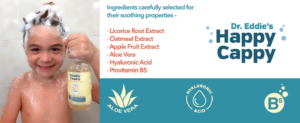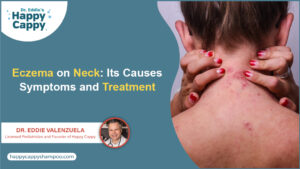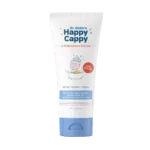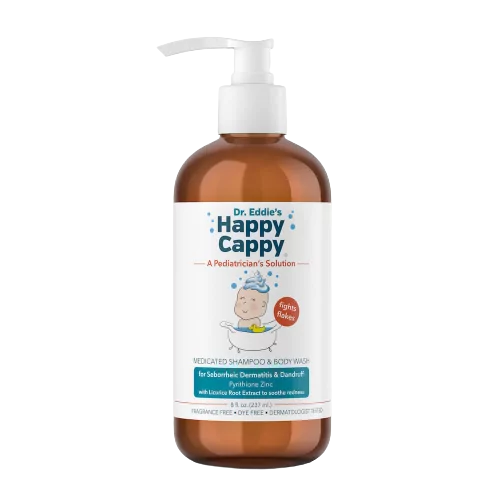Have an itchy red neck? It might be a sign of that irritating skin condition known as eczema. Dry, itchy, and flaky skin can show up anywhere on the body, yes, even on the neck.
This blog will help you understand what eczema on neck is, what causes it and how to treat it to get your itch-free neck back again.
Is Eczema on Neck a Thing?
Yes, while we don’t think about it very often, the neck is very commonly affected by eczema. In fact, the head and neck are affected in about 50% of adults and 79% of children with atopic dermatitis, or neck eczema as it can be called.
There’s even a specific name for eczema that affects the head and neck: Head and Neck Dermatitis (HND).
The prevalence of eczema on the neck makes sense, as skinfolds like the back of the neck, the crook of the arms, or diaper areas are particularly vulnerable to eczema. But what causes eczema on the neck? And what can you do about it?
Causes of Eczema on Back of Neck
In many instances, Head and Neck Dermatitis (HND) is caused by a reaction to an allergen or irritant. The neck can be severely affected if it comes into contact with an allergen like
- Jewellery
- Nickel
- Chemicals in lotion and creams
- Cosmetics
- Fragrance and perfumes
- Shampoo and body wash
HND is also commonly caused by irritation from triggering substances and products like
- Wool scarves
- Tight clothing
- Tags or labels
- Detergents
Other environmental factors that can trigger neck eczema are:
- Extreme weather
- Sweating
- Stress
What Does Eczema Look Like on Neck?
Eczema on the neck can cause the following symptoms. A person may experience a few or all of these eczema symptoms.
- Itchy skin
- Dryness
- Red rashes
- Bumps and blisters that may ooze
- Scaly patches
- Sensitive skin
- Skin thickening on the back of neck.
Eczema VS Psoriasis
Eczema and psoriasis are two common skin conditions that look quite similar. Some people may confuse eczema for psoriasis due to flaky, crusty patches on skin. Both the conditions can cause red rashes on skin and discoloration.
- Eczema usually causes dry rather thin scaly patches that are usually red or pink in color. While psoriasis may cause very thick scaly patches in red or silvery color resembling to fish scales.
- Itching is experienced in both conditions but the intensity of itch is more severe in eczema.
How to Treat Eczema on the Neck
There is no permanent cure for any type of eczema, including eczema on the neck. However many successful interventions can soothe symptoms and help prevent eczema flare-ups.
The most effective treatments for eczema are skin care, itch control, and trigger management:
Skin Care
The right skin care can help protect your skin’s natural barrier to fight back against irritants, soothe current symptoms, and prevent future eczema flare-ups. There are two main components of proper eczema skin care:
Cleansing

- Cleanse skin at least once a day using a gentle, non-soap cleanser or an eczema shampoo and body wash.
- Use lukewarm water to wash the skin
- Pat dry the skin instead of rubbing it.
Moisturizing
- Follow up every cleanse with a baby eczema cream.
- Moisturize the neck at least twice daily to prevent dryness and soothe eczema symptoms.
- Always moisturize your skin immediately after taking a bath.
- Choose a cream for eczema which made with natural ingredients like Happy Cappy Moisturizing Cream for Eczema this cream will lock in moisture and help protect the skin from irritants.
Itch Control
The back of the neck is a very accessible area that is easy to scratch. But scratching itchy eczema will only make it worse and can even cause infection and scarring. Use a moisturizing eczema cream to control itching and prevent scratching.
Trigger Management
Neck eczema is often caused or worsened by triggers, or environmental factors that can irritate the skin.
- Avoid the triggers that might be causing your eczema.
- Choose products that are hypoallergenic and have a low pH level.
- Avoid using jewelry and metal around the neck.
- If any skincare product is the culprit, discontinue its use.
- Avoid going out in direct sunlight without proper skin protection.
- Wear loose fitting clothes with breathable fabric.
- Use fragrance-free detergents for washing your clothes.
Conclusion
Eczema on neck is more common than we know, even though it causes itchy, flaky, dry skin around the neck. If proper attention and care is not given it can get worse and lead to other complications like skin infections.
Neck eczema can be easily managed by taking proper care of the skin and avoiding the triggers. Cleanse your skin with an eczema cleanser once daily and moisturize it with an eczema cream at least twice daily.
If you are searching for hypoallergenic eczema products for your sensitive, dry skin then try Happy Cappy Two-Step Eczema Skincare Routine. It contains a daily eczema shampoo that can be used as a body wash and face wash as well and a fast-absorbing, non-greasy eczema cream to hydrate your skin all day long. Use it daily to soothe eczema-prone skin on the neck.
FAQs
What Triggers Eczema on the neck?
There are certain factors that can trigger eczema on the neck and cause red, itchy rashes, such as
1 Chemicals in makeup and skincare products
2 Dry skin
3 Cold, dry air
4 Extreme weather conditions
5 Food allergy.
How to get rid of dark eczema on the neck?
Eczema often causes the skin to become darker in lighter skin tones, it can cause red or pink rashes, and in darker skin tones, it can cause the skin to become brown or darker than the skin.
In most cases, this darkening of skin color gets better as the eczema symptoms are alleviated. However, consult a dermatologist if you are still experiencing skin darkening or are worried about it. They may prescribe certain medications and OTC products to use.
How long will eczema on my neck last?
It depends on the severity of the condition and what might be causing your eczema. In mild cases, an eczema flare-up may be soothed with proper skin care in a few days or weeks.
Eczema caused by irritants may get better faster once the irritant is removed. However, eczema caused by allergens takes more time to get better.
What is best to soothe neck eczema?
The best way to soothe itching, irritation, and rashes associated with neck eczema is by moisturizing the skin with an eczema cream. An eczema cream like Happy Cappy Moisturizing Cream is a great option to choose from. It is infused with natural ingredients and is specially created by a pediatrician to soothe eczema symptoms and soothe eczema-prone skin.
Can eczema cause a burning sensation on neck?
Yes, especially in severe cases of eczema on the neck, it can cause a burning sensation, intense itching, dryness, swelling, and red rashes. The skin on the neck is soft and sensitive and can be easily irritated by scratching. So avoid scratching to prevent the condition from getting worse











